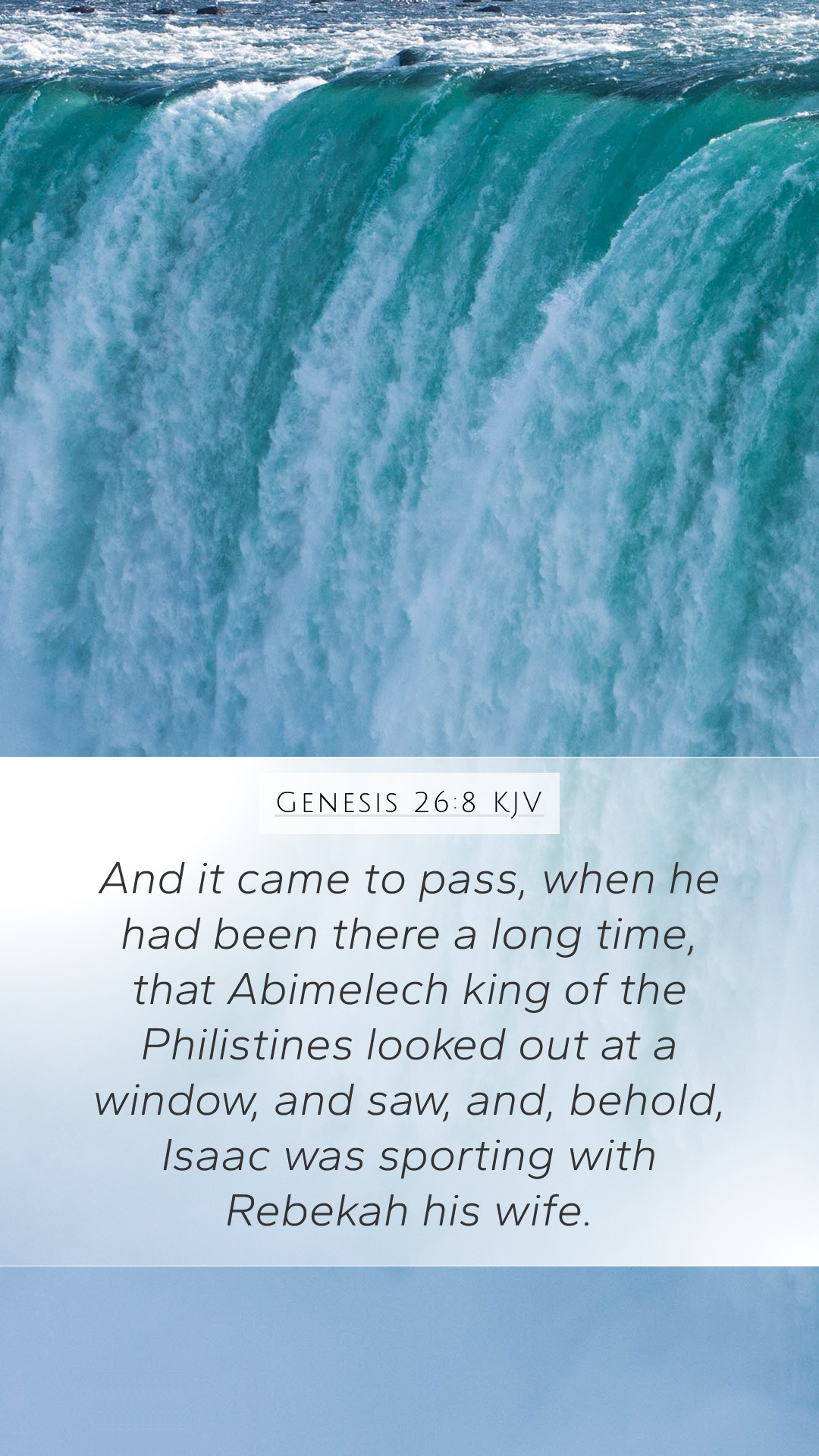Understanding Genesis 26:8
In Genesis 26:8, we find a significant moment concerning Isaac, the son of Abraham, as he dwells in Gerar during a time of famine. The verse describes how Isaac was observed by Abimelech, the Philistine king, looking fondly at Rebekah, his wife. This highlights themes of love, deception, and divine protection. To gain a deeper understanding of this scripture, we can draw on insights from well-regarded public domain commentaries.
Biblical Context
The story unfolds amidst challenges faced by Isaac, particularly during a famine. Isaac chooses to stay in Gerar rather than move to Egypt, indicating his faith in God's guidance. By analyzing the context, we notice the importance of place and how divine direction leads individuals in times of adversity.
Commentary Insights
-
Matthew Henry:
Matthew Henry emphasizes the protective nature of God's providence. He points out that Isaac's situation illustrates how God watches over His people, guiding them even through perilous circumstances. The observation of Abimelech serves as a reminder of the watchfulness of God and the importance of integrity, particularly in spiritual matters.
-
Albert Barnes:
Albert Barnes offers insights into the cultural implications of Isaac's situation. He notes that in the ancient Near Eastern context, the sighting of a married couple, particularly the husband exhibiting affection, could lead to serious misunderstandings. Barnes also highlights that Isaac's actions reflect the common social norms of the time regarding marital relationships and protection.
-
Adam Clarke:
Adam Clarke delves deeper into the emotional aspect of the narrative. He describes the genuine love Isaac has for Rebekah and how this is displayed through his actions. Clarke suggests that this moment is not only a testament to their relationship but also underscores the significance of love in the life of believers. He points out that such love is often subjected to scrutiny but remains a cornerstone of faithful living.
Key Themes and Messages
-
Divine Providence:
Understanding Scripture shows that God’s providence is a recurrent theme, as seen in how He looks after Isaac amidst difficulties. This trust in God’s plan provides comfort to believers today.
-
Love and Protection:
The dynamic between Isaac and Rebekah illustrates the beauty of marital affection and the protective instincts that come with love. This serves as a model for Christian relationships.
-
Honesty and Integrity:
The narrative encourages readers to consider the implications of honesty within relationships, especially in challenging times. Isaac’s choices can prompt discussions in Bible study groups about the power of truth.
Cross References
- Genesis 20:10-13: Where Abraham also faced challenges similar to Isaac's with his wife.
- Genesis 24:67: The love story of Isaac and Rebekah, representing covenantal faithfulness.
- Genesis 26:1: The initial mention of the famine and God's instructions to Isaac.
- Proverbs 18:22: A verse that emphasizes the favor of finding a good spouse.
- 1 Peter 3:7: This New Testament reference highlights the importance of treating one’s spouse with honor.
Applying the Verse to Daily Life
This verse's nuances encourage believers to reflect on their relationships, the importance of integrity, and their reliance on God’s guidance. As part of Bible study lessons, one could explore how to live out these principles in modern contexts.
Further Study
For those looking to deepen their understanding of Genesis 26:8 and its implications, consider engaging with the following topics:
- How to Interpret Bible Verses
- Understanding Difficult Bible Passages
- In-Depth Bible Verse Analysis
- Applying Bible Verses to Daily Life
Conclusion
Genesis 26:8 serves as a rich verse for exploration, illustrating the intersection of marital love, divine oversight, and moral integrity. As believers seek to understand and apply the meaning of Bible verses in their lives, insights from public domain commentaries enhance our perspective and encourage deeper engagement with the text.


